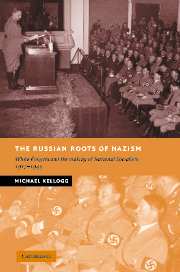Book contents
- Frontmatter
- Contents
- Acknowledgments
- List of abbreviations
- Introduction
- 1 The far right in the German and Russian Empires
- 2 At the extreme in the Ukraine and in Germany
- 3 “Hand in hand with Germany”
- 4 The international radical right's Aufbau (reconstruction)
- 5 “Germany–Russia above everything”
- 6 Conspiracies of fire and the sword
- 7 “In Quick March to the Abyss!”
- 8 The four writers of the apocalypse
- 9 Aufbau's legacy to National Socialism
- Conclusion
- Bibliography
- Index
- NEW STUDIES IN EUROPEAN HISTORY
5 - “Germany–Russia above everything”
Published online by Cambridge University Press: 23 July 2009
- Frontmatter
- Contents
- Acknowledgments
- List of abbreviations
- Introduction
- 1 The far right in the German and Russian Empires
- 2 At the extreme in the Ukraine and in Germany
- 3 “Hand in hand with Germany”
- 4 The international radical right's Aufbau (reconstruction)
- 5 “Germany–Russia above everything”
- 6 Conspiracies of fire and the sword
- 7 “In Quick March to the Abyss!”
- 8 The four writers of the apocalypse
- 9 Aufbau's legacy to National Socialism
- Conclusion
- Bibliography
- Index
- NEW STUDIES IN EUROPEAN HISTORY
Summary
In his memoirs, the influential völkisch leader and former Aufbau member General Erich von Ludendorff complained bitterly that it had proven impossible to combine all White monarchical crosscurrents in Germany into one stream. Ludendorff's assessment of the situation had merit. While Aufbau convinced Hitler of the complementary nature of German and Russian anti-Entente, anti-Weimar Republic, anti-Bolshevik, and anti-Semitic interests, the conspiratorial organization could not consolidate all White émigrés in Germany (and beyond) under its leadership to form a common front against the Weimar Republic and “Jewish Bolshevism.” White émigrés seemed united at the May–June 1921 Monarchical Congress at Bad Reichenhall in Bavaria that Aufbau had organized, but appearances proved deceiving.
In an increasingly acrimonious power struggle, Aufbau and Nikolai Markov II's Supreme Monarchical Council, which had been established at the Bad Reichenhall Congress, offered divergent visions of how to overthrow Bolshevism in the course of 1921–1923. Aufbau fostered National Socialist–White émigré collaboration to place Grand Prince Kirill Romanov at the head of a Russian monarchy that would be allied with autonomous Ukrainian and Baltic states. Markov II's Council opposed Aufbau's pro-German designs for reorganizing the East. Despite operating from Berlin, the Council increasingly vehemently backed the Tsarist candidacy of Grand Prince Nikolai Nikolaevich Romanov, Kirill's cousin, who lived in Paris and had close ties with the French government. The Supreme Monarchical Council counted on French military assistance in its schemes to topple the Bolshevik regime.
- Type
- Chapter
- Information
- The Russian Roots of NazismWhite Émigrés and the Making of National Socialism, 1917–1945, pp. 136 - 165Publisher: Cambridge University PressPrint publication year: 2005



